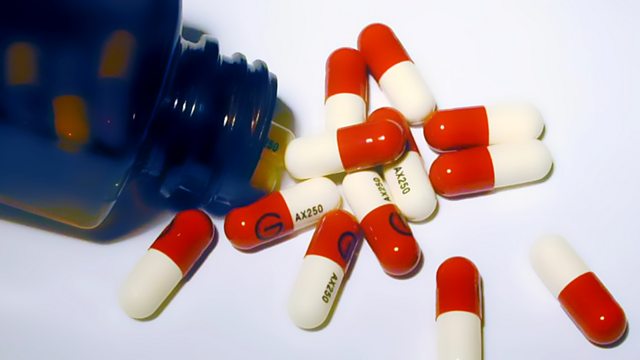Episode 1
Roland Pease examines how bacteria are developing resistance to an increasing number of antibiotics and asks where the new drugs are to prevent a return to the medical dark ages.
In the first part of this two part series, science journalist Roland Pease looks at the key scientific issues behind why increasing numbers of antibiotic drugs are becoming useless. He examines the disturbing lack of new drugs that are becoming available to doctors to replace the obsolete ones.
The discovery and deployment of antibiotic drugs in the mid twentieth century led some medics to predict the end of infectious diseases. But the bacteria fought and continue to fight back, evolving resistance to many of the drugs that used to kill them.
Public health officials warn that without new drugs, medicine will return to the days where 'a cut finger on Monday leads to death of Friday'. Without protective antibiotics to keep infections at bay, scores of standard surgical operations, chemotherapy for cancer, organ transplants and kidney dialysis will become too risky. Sally Davies, the chief medical officer for England, has described this scenario as the end of modern medicine and has compared the dangers of the antibiotic crisis to threat from international terrorism.
The injudicious use of these drugs means that antibiotic-resistant forms are now everywhere. Human bodies, rivers and soils are environments where antibiotic-resistant forms can flourish in the absence of drug-susceptible bacterial brethren.
The problem is a global one and the conditions which encourage the emergence of resistant bugs exist in many environments, not just in patients and on unclean hospital floors. Liz Wellington of the University of Warwick monitors the prevalence of antibiotic resistant bugs lurking in the mud of rivers in the UK. They've got there from us via the UK's sewage systems.
Prevalence of some drug-resistant bugs is high enough in British rivers but the situation in rivers such as India and China is "horrendous" according to Liz Wellington. One pharmaceutical factory in China was found to be flushing extraordinary amounts of the antibiotic fluoroquinolone into a local river. The quantity dumped by this one factory every day was equal to the amount consumed by all the patients in Scandinavia in a year.
With international air travel, resistant bacteria which emerged after this level of exposure in China could be in Copenhagen, Stockholm or London within 24 hours.
While the wider world is awash in antibiotics and antibiotic resistance is on the rise, there is little comfort to be gained from looking at the prospects for new drugs coming to the market. The last new class of antibiotic was discovered in a lab the 1980s and it took almost 30 years to get to the clinic. Most new drugs coming to market are chemical variants of existing types of drugs.
After his young son almost died of a multidrug-resistant infection following appendicitis, medicinal chemist Michael Kinch looked at the historical trends in antibiotic invention by the pharmaceutical industry since the mid 20th century. There was a sharp decline 15 years ago. From the 1950s through to the end of the 1990s, three new antibiotic medicines came onto the market every year. In the first decade of the 21st century, the number plummeted to one new drug every other year - a sixfold decrease. Even worse, antibiotics are falling out of use at twice the rate of new ones are becoming available to doctors.
More bad news comes from Professor Laura Piddock at the University of Birmingham, the scientific task of inventing novel kinds of antibiotics is much more challenging than it once was: "The low hanging fruit has been picked".
(The second part of the series will look at why pharmaceutical companies have turned away from antibiotic research and development, and ideas now being discussed by government and industry to restart the antibiotic pipeline and avert the looming resistance crisis.).
Last on
More episodes
Previous
You are at the first episode
Next
Broadcasts
- Tue 17 Mar 2015 11:00大象传媒 Radio 4
- Mon 23 Mar 2015 21:00大象传媒 Radio 4

